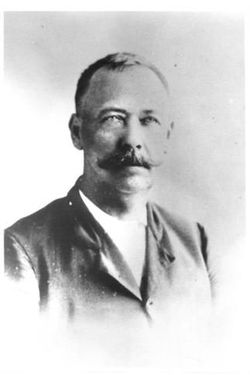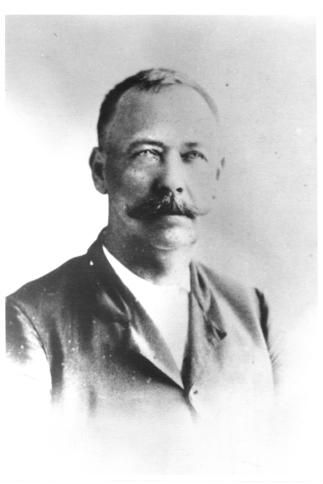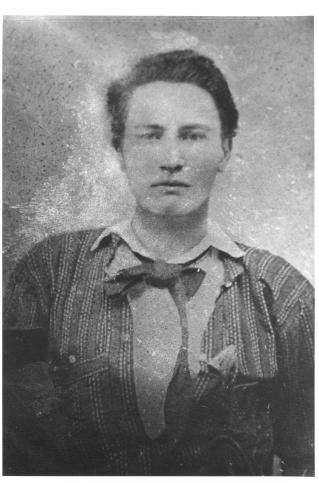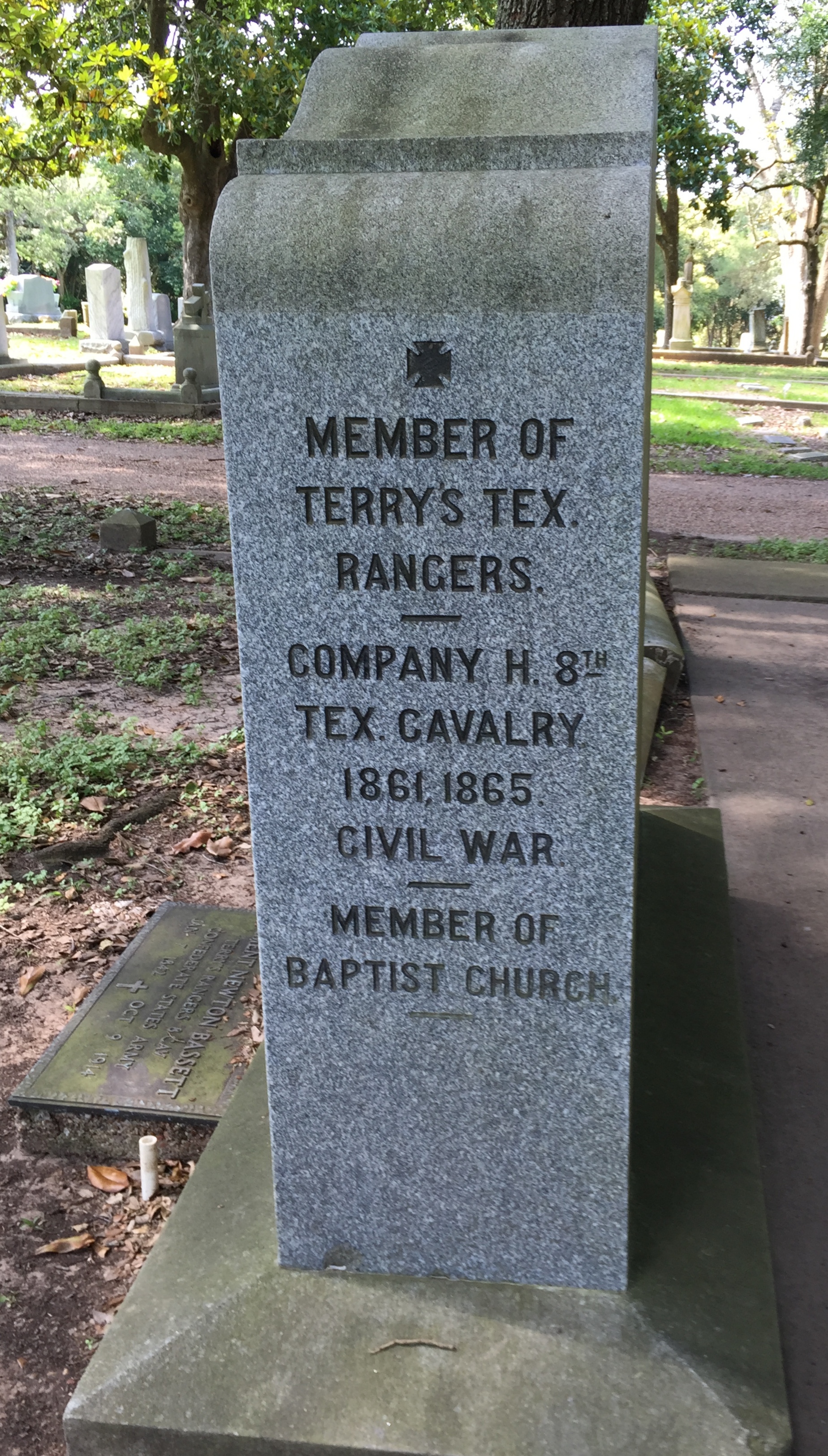On September 7, 1861, 19-year-old Clem Bassett joined Company H of the Eighth Texas Cavalry, Confederate States Army. The Eighth Texas Cavalry was popularly known as Terry's Texas Rangers.
"The regiment first went to Kentucky, was sent to Corinth, Mississippi, took part in the battle of Shiloh, next went to Murfreesborough, and Captain Bassett was a participant in practically every battle of the western army and fought in fully a thousand skirmishes. His battle record includes the engagements at Perryville, Chattanooga, Missionary Ridge, Atlanta, Lookout Mountain, Savannah and others. His first wound came at Eagleville, Tennessee, and at Aiken, South Carolina, he was shot in the back of the head by a minie ball. He was wearing a fine broad-brimmed Spanish hat. The bullet went through a silver ornament, a thick cord and the hat and, after shattering the skull, imbedded itself in the outer covering of the brain. The bullet was removed by the field surgeon, and the captain then spent six weeks in the hospital. He continued to suffer from this wound for twenty years after it had been inflicted. The war ended while Captain Bassett was off duty as the result of this wound.
"Among the old soldiers of the south, there was never one who was associated with Captain Bassett who did not give him the highest tribute as to his gallantry and courage and individual efficiency. The occasion of his being mentioned in the voluminous work pertaining to the Civil war, as related above, was the capture of a battery at Murfreesborough, an exploit in which he was chiefly responsible, and for which he was voted a medal by the Confederate Congress. Owing to the outcome of the war, this medal was never struck nor bestowed. Captain Bassett was a warm personal friend of the late Joe Wheeler, and a deep mutual admiration subsisted between the two, though differing widely in official rank. It is related that on one occasion General Wheeler openly applauded this gallant Confederate soldier. This occurred at Sandersville, Georgia, when Bassett led a brave charge against the enemy, and his dashing courage caused General Wheeler to toss his hat in the air and shout, 'Three cheers for Clem Bassett.'
"After the war, and on his return to Richmond, Captain Bassett began his career as a farmer and stock raiser, and for twenty years was in the mercantile business at the old town of Richmond. He finally retired two years ago on account of ill-health, and now enjoys a quiet prosperity and lives among his friends and associates of many years. He has been prosperous in business, has acquired considerable property, and in April, 1913, finished a very elegant and beautiful residence in Richmond."
Frank W. Johnson, A History of Texas and Texans, Vol. III (Chicago and New York: The American Historical Society, 1914) p. 1542.
On October 27, 1870, Clem Bassett married Miss Lida Moore, a daughter of Dr. Matthew Moore of Alabama. Lida Bassett died with the birth of her first child, an unnamed boy, and she and her baby were buried on her first wedding anniversary. Clem apparently took the death of his wife and son hard as he didn't remarry for nearly fifteen years. On April 8, 1885, Clem married his second wife, Miss Libbie Mitchell, daughter of John and Eleanora (Swiney) Mitchell.
Clem Bassett's paternal great-grandfather was Lt. Fortunatus Bassett (1742-1778) who served in the Revolutionary War and died in the tragedy on the brig General Arnold December 26-27, 1778 in Plymouth Harbor when more than 70 men froze to death. Lt. Fortunatus' middle son, Fortunatus, the grandfather of Clem, married Sybil Bacon. Sybil's grandfather was Lt. John Bacon who was a Minute Man in Needham, Massachusetts and was shot and killed by British forces on April 19, 1775 during the Battle of Lexington and Concord.
- - - -
BASSETT, CLEMENT NEWTON
Clement Newton Bassett, now one of the most prominent citizens, a successful businessman and former county official, was the first white male child born in the town of Richmond, Fort Bend County. The date of his birth was January 7, 1842. He was a son of one of the early lawyers of the Republic of Texas, Clement Newton Bassett, the senior,
After an education in private schools, and at the age of nineteen, the Civil war having begun, Clem Bassett, as he was then known, enlisted in Company H of Terry's Rangers and saw strenuous service throughout the war, having distinguished himself for his bravery on many occasions, winning the admiration of all when he captured a cannon from the enemy at the battle of Murfreesboro, Tennessee. He had a number of horses shot while riding them, one being shot in seven places in one fight. He was wounded while in Tennessee and later in South Carolina. The war over, he returned home to Richmond, and engaged in the stock business from 1865 to 1870. From the latter date to 1885 he was in the merchandise business at Richmond, and then undertook farming operations on a large scale. He and Mr. Winston, the present sheriff of Fort Bend County, were in partnership, and at one time they had about four thousand acres in cultivation. Since then he has reduced the scope of his farming business, and on his own account now farms 1,200 acres in corn and cotton, also dealing in cattle and real estate, and is a director in the Richmond and Rosenberg Cotton Company.
In 1900 Mr. Bassett was elected sheriff of Fort Bend County, during the political troubles of the "Jaybirds" and "Woodpeckers," and held the office during a term when its duties were more than ordinarily dangerous and exacting. In 1902 he was elected tax collector, serving four years. His politics is Democratic. He has been an active member of the Richmond Baptist church for nearly forty years and is one of the deacons of the church. The camp of Confederate Veterans at Richmond is called Clem Bassett Camp, in his honor, and he is its commander.
Mr. Bassett married, in 1869, Miss Lida A. Moore, a daughter of Dr. Matthew A. Moore, of Richmond. She died a year after the marriage. In 1885 he married Miss Libbie A. Mitchell, whose father was John C. Mitchell, of Richmond, a noted criminal lawyer of the state. They have five living children: Eleanor, wife of Hugh L. Williams, of St. Louis; Clement N., Jr., associated with his father in business; Robert, who is attending college; Winston, and Gerald Wheeler. Historical Review of South-East Texas, Vol 2, by Dermot Hardy and Maj. Ingham S. Robert, by The Lewis Publishing Company, Chicago, 1910
Thank you to contributor: Sherry (47010546)
On September 7, 1861, 19-year-old Clem Bassett joined Company H of the Eighth Texas Cavalry, Confederate States Army. The Eighth Texas Cavalry was popularly known as Terry's Texas Rangers.
"The regiment first went to Kentucky, was sent to Corinth, Mississippi, took part in the battle of Shiloh, next went to Murfreesborough, and Captain Bassett was a participant in practically every battle of the western army and fought in fully a thousand skirmishes. His battle record includes the engagements at Perryville, Chattanooga, Missionary Ridge, Atlanta, Lookout Mountain, Savannah and others. His first wound came at Eagleville, Tennessee, and at Aiken, South Carolina, he was shot in the back of the head by a minie ball. He was wearing a fine broad-brimmed Spanish hat. The bullet went through a silver ornament, a thick cord and the hat and, after shattering the skull, imbedded itself in the outer covering of the brain. The bullet was removed by the field surgeon, and the captain then spent six weeks in the hospital. He continued to suffer from this wound for twenty years after it had been inflicted. The war ended while Captain Bassett was off duty as the result of this wound.
"Among the old soldiers of the south, there was never one who was associated with Captain Bassett who did not give him the highest tribute as to his gallantry and courage and individual efficiency. The occasion of his being mentioned in the voluminous work pertaining to the Civil war, as related above, was the capture of a battery at Murfreesborough, an exploit in which he was chiefly responsible, and for which he was voted a medal by the Confederate Congress. Owing to the outcome of the war, this medal was never struck nor bestowed. Captain Bassett was a warm personal friend of the late Joe Wheeler, and a deep mutual admiration subsisted between the two, though differing widely in official rank. It is related that on one occasion General Wheeler openly applauded this gallant Confederate soldier. This occurred at Sandersville, Georgia, when Bassett led a brave charge against the enemy, and his dashing courage caused General Wheeler to toss his hat in the air and shout, 'Three cheers for Clem Bassett.'
"After the war, and on his return to Richmond, Captain Bassett began his career as a farmer and stock raiser, and for twenty years was in the mercantile business at the old town of Richmond. He finally retired two years ago on account of ill-health, and now enjoys a quiet prosperity and lives among his friends and associates of many years. He has been prosperous in business, has acquired considerable property, and in April, 1913, finished a very elegant and beautiful residence in Richmond."
Frank W. Johnson, A History of Texas and Texans, Vol. III (Chicago and New York: The American Historical Society, 1914) p. 1542.
On October 27, 1870, Clem Bassett married Miss Lida Moore, a daughter of Dr. Matthew Moore of Alabama. Lida Bassett died with the birth of her first child, an unnamed boy, and she and her baby were buried on her first wedding anniversary. Clem apparently took the death of his wife and son hard as he didn't remarry for nearly fifteen years. On April 8, 1885, Clem married his second wife, Miss Libbie Mitchell, daughter of John and Eleanora (Swiney) Mitchell.
Clem Bassett's paternal great-grandfather was Lt. Fortunatus Bassett (1742-1778) who served in the Revolutionary War and died in the tragedy on the brig General Arnold December 26-27, 1778 in Plymouth Harbor when more than 70 men froze to death. Lt. Fortunatus' middle son, Fortunatus, the grandfather of Clem, married Sybil Bacon. Sybil's grandfather was Lt. John Bacon who was a Minute Man in Needham, Massachusetts and was shot and killed by British forces on April 19, 1775 during the Battle of Lexington and Concord.
- - - -
BASSETT, CLEMENT NEWTON
Clement Newton Bassett, now one of the most prominent citizens, a successful businessman and former county official, was the first white male child born in the town of Richmond, Fort Bend County. The date of his birth was January 7, 1842. He was a son of one of the early lawyers of the Republic of Texas, Clement Newton Bassett, the senior,
After an education in private schools, and at the age of nineteen, the Civil war having begun, Clem Bassett, as he was then known, enlisted in Company H of Terry's Rangers and saw strenuous service throughout the war, having distinguished himself for his bravery on many occasions, winning the admiration of all when he captured a cannon from the enemy at the battle of Murfreesboro, Tennessee. He had a number of horses shot while riding them, one being shot in seven places in one fight. He was wounded while in Tennessee and later in South Carolina. The war over, he returned home to Richmond, and engaged in the stock business from 1865 to 1870. From the latter date to 1885 he was in the merchandise business at Richmond, and then undertook farming operations on a large scale. He and Mr. Winston, the present sheriff of Fort Bend County, were in partnership, and at one time they had about four thousand acres in cultivation. Since then he has reduced the scope of his farming business, and on his own account now farms 1,200 acres in corn and cotton, also dealing in cattle and real estate, and is a director in the Richmond and Rosenberg Cotton Company.
In 1900 Mr. Bassett was elected sheriff of Fort Bend County, during the political troubles of the "Jaybirds" and "Woodpeckers," and held the office during a term when its duties were more than ordinarily dangerous and exacting. In 1902 he was elected tax collector, serving four years. His politics is Democratic. He has been an active member of the Richmond Baptist church for nearly forty years and is one of the deacons of the church. The camp of Confederate Veterans at Richmond is called Clem Bassett Camp, in his honor, and he is its commander.
Mr. Bassett married, in 1869, Miss Lida A. Moore, a daughter of Dr. Matthew A. Moore, of Richmond. She died a year after the marriage. In 1885 he married Miss Libbie A. Mitchell, whose father was John C. Mitchell, of Richmond, a noted criminal lawyer of the state. They have five living children: Eleanor, wife of Hugh L. Williams, of St. Louis; Clement N., Jr., associated with his father in business; Robert, who is attending college; Winston, and Gerald Wheeler. Historical Review of South-East Texas, Vol 2, by Dermot Hardy and Maj. Ingham S. Robert, by The Lewis Publishing Company, Chicago, 1910
Thank you to contributor: Sherry (47010546)
Family Members
Sponsored by Ancestry
Advertisement
Advertisement

















